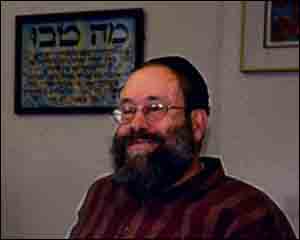|
PROFILE Rabbi who spreads his message in wilderness | |
CHASSIDIC rabbi Henoch Dov Hoffman teaches Judaism through adventure treks in America's Rocky Mountains.
The rabbi, who is also a trained special-needs educator and psychodrama therapist, believes the trials of his wilderness endurance tests mirror the tests that God gives each of us in life. "A lot of Jews are trapped in an urban environment," he told me. "We teach people through failure. We are trying to teach people how to do teshuva (repentance), how to embrace failure and learn from it. "The Jewish approach goes against the trend of western civilisation which emphasises success. Our education system under-values failure. "Every Jew has the gift of a deficit from Hashem. That root deficit has to be discovered." The American rabbi, who was influenced by the work of Scottish Gordonstoun School founder, German Jewish Kurt Hahn, in the value of the outdoors in personal development, quoted a British example of survival in the face of adversity. He said: "People have varying degrees of failure on treks. They can learn from the failures. For example, if I assign someone to start a fire with wet wood, they usually fail several times. This is a good thing. They can learn from their mistakes. "Some of my first teachers were Englishmen from the Royal Marines. As it rains all the time in Scotland, they had to learn how to light a fire if they wanted to survive and make tea." Rabbi Hoffman's son, Ari, who is studying the psychology of survival, wrote an account of the Torah lessons which he learned from being stranded, injured on the snowy slopes of a nearby mountain he had failed to climb because of bad weather conditions. Although hailing from Ukrainian Chassidic roots, Rabbi Hoffman was raised in an American Conservative community. "My great-grandparents were students of Rabbi Menachem Twerski, of Chernobyl in Ratna, Ukraine," he explained. "The first Jews to come to Denver, Colorado, in 1890 were a group from Ratna." The Ukrainian Jews were settled on the Colorado mountains by Baron Hirsch, a wealthy German Jew who sponsored Jewish settlements all over Canada and North and South America. In Denver, the Jews from Ratna set up the Zera Abraham Synagogue, which appointed as their minister Rabbi Shlomo Twerski, a great-nephew of Rabbi Menachem Twerski, of Chernobyl. In his adulthood, Rabbi Hoffman, whose parents had somewhat followed the American assimilationary trend, became greatly influenced by Rabbi Twerski, as well as by the famous singing rabbi Shlomo Carlebach. But Rabbi Hoffman initially had no intention of becoming a rabbi himself. His first career was in special-needs education working in the innovative Outwood Bound School in Marble, Colorado. The Outwood Bound School was founded upon the same principles as Scotland's Gordonstoun School, which has included in its famous pupils the Duke of Edinburgh, Princes Charles, Edward and Andrew and royals Zara and Peter Phillips. Over the years, Rabbi Hoffman felt inspired to combine Chassidic teachings with Hahn's principles of the outdoors, combined with psychodrama therapeutic methods. In his late 60s, Rabbi Hoffman is still as active as ever in combining the different strands in his life. When not leading a spiritual journey on the Rocky Mountains, or on a pilgrimage to the eastern European graves of his Chassidic masters or in Israel, Rabbi Hoffman teaches Talmud and chassidut daily in his Denver shtiebel, as well as giving psychotherapy sessions. This summer he was leading groups in two places of current conflict, Israel and Ukraine. Rabbi Hoffman - who volunteered in the Six-Day War, when he was a student at Hebrew University, and who has twice crossed the Sinai Desert when it was under Israeli jurisdiction - told me that he had been in Israel during five wars. Every summer he leads a pilgrimage of rabbinic graves, first in Safed, then eastern Europe. Just back from a pilgrimage of Chassidic graves from Kiev to Warsaw, Rabbi Hoffman was overwhelmed by the amazing experiences of interfaith reconciliation which he witnessed at these places. In his ancestral home of Ratna, he was met by an elderly man who had been waiting 65 years to meet a Jew. The man was five years old when 3,500 local Jews were killed in a ravine there by the Nazis. The Ukrainian told the rabbi that a little five-year-old Jewish boy managed to run away. The Ukrainian child took pity on the Jewish child and brought him food and water for 30 days until a neighbour informed upon the young Jew and he was shot. In the Polish town of Ishbitz, the rabbi met a German historian from Dusseldorf who was producing a German TV programme on the story of thousands of Jews who were taken to the little Polish village of Chassidic fame to be shot. The historian told him that her father, who had served in the Wehrmacht, did not want to hear about the story. Rabbi Hoffman said: "We had several children of Holocaust survivors in our group. They said that their parents also suppressed stories out of shame. The oppressors suppressed the story out of guilt." Last Shabbat, Rabbi Hoffman ran a Wilderness Shabbat in his cabin in the Rockies. He said: "I have made 40 such experiences parallel to the 40 years in the wilderness." Americans designate their wild National Parks as Wildernesses. In the autumn, he is to lead a Wilderness expedition in Utah, relating the group's experiences to Torah teachings.
|
